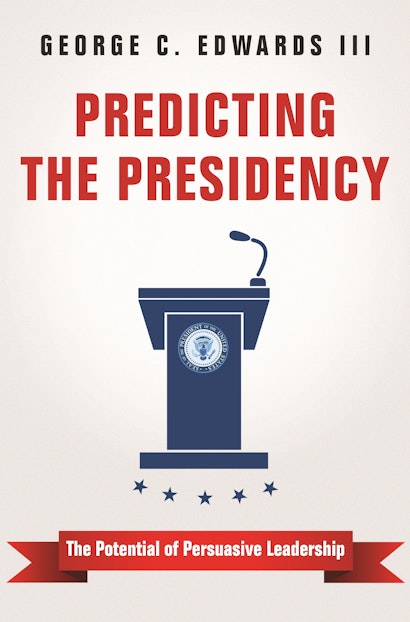Millions of Americans鈥攊ncluding many experienced politicians鈥攙iewed Barack Obama through a prism of high expectations, based on a belief in the power of presidential persuasion. Yet many who were inspired by candidate Obama were disappointed in what he was able to accomplish once in the White House. They could not understand why he often was unable to leverage his position and political skills to move the public and Congress to support his initiatives. Predicting the Presidency explains why Obama had such difficulty bringing about the change he promised, and challenges the conventional wisdom about presidential leadership.
In this incisive book, George Edwards shows how we can ask a few fundamental questions about the context of a presidency鈥攖he president’s strategic position or opportunity structure鈥攁nd use the answers to predict a president’s success in winning support for his initiatives. If presidential success is largely determined by a president’s strategic position, what role does persuasion play? Almost every president finds that a significant segment of the public and his fellow partisans in Congress are predisposed to follow his lead. Others may support the White House out of self-interest. Edwards explores the possibilities of the president exploiting such support, providing a more realistic view of the potential of presidential persuasion.
Written by a leading presidential scholar, Predicting the Presidency sheds new light on the limitations and opportunities of presidential leadership.
George C. Edwards III is University Distinguished Professor of Political Science and the Jordan Chair in Presidential Studies at Texas A&M University. His many books include Overreach: Leadership in the Obama Presidency and The Strategic President: Persuasion and Opportunity in Presidential Leadership (both Princeton).
"Edwards' central findings on the limits of presidential persuasion are in my view some of the most important in the literature of American politics. . . . Predicting the Presidency should be widely read."鈥擯aul J. Quirk, Congress & the Presidency
"George Edwards is one of the shrewdest observers of American politics. His latest book is a must-read for scholars, political journalists, and any citizen who wants to understand the modern presidency."鈥擱yan Lizza, Washington correspondent for the New Yorker and political commentator for CNN
"As the nation gears up for another presidential election, we can expect the candidates running for office and the media that cover them to stoke our yearnings for transformative change. Not so fast, George Edwards warns. Presidential leadership rarely involves remaking the polity. Rather, it demands that presidents effectively (and soberly) identify and then exploit political opportunities where they lay. In this timely book, Edwards offers a primer for how to measure the next president's chances."鈥擶illiam G. Howell, author of Thinking about the Presidency: The Primacy of Power
"Edwards explains what determines whether a president fails or succeeds in pursuing his agenda. In so doing, he once again substantially redefines what we know about the presidency and American democracy. Another seminal Edwards contribution!"鈥擩ames N. Druckman, Northwestern University
"A superb and original work that all scholars of the presidency will have to engage with. Future presidents would be well advised to pay attention to it as well. No one in the last fifty years has done more than Edwards to clarify the reach, and the limits, of presidential leadership."鈥擪enneth R. Mayer, author of With the Stroke of a Pen: Executive Orders and Presidential Power
"Edwards's book is a major contribution to the literature on the presidency. Extremely well written and carefully and extensively researched, Predicting the Presidency will generate considerable public and scholarly debate as we complete another election cycle and inaugurate a new president."鈥擲tephen J. Wayne, Georgetown University
"Edwards does an excellent job of arguing for the timeless nature of the institution of the presidency as it struggles to overcome its structural constraints, caught up as it is in the web of separate institutions sharing powers. His readable style masks a huge erudition."鈥擜ndrew Rudalevige, Bowdoin College

